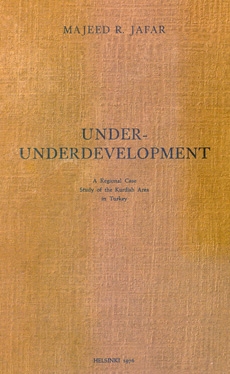|
PREFACE
The present work treats of an underdeveloped area within an underdeveloped or developing country; hence, the title is "Under-Underdevelopment". The research was conducted within the disciplines of economics underdevelopment and social policy regional policy. The analysis of the subject matter was carried out within its historical and political contexts. Its purpose is the study of socio-economic conditions and trends and social dilemmas prevailing in the area.
I would like to express my gratitude to Prof. O. Riihinen for his continued help, guidance and criticism. I would also like to thank Prof. J. Lehtinen for his help and many useful suggestions. Many individuals have helped me in various ways throughout the preparation and writing of this work; to all of them I would like to express my thanks.
I am also thankful to the Social Policy Association for meeting part of the costs of printing this study and for publishing it under its seriers.
I would like to thank Lindy Jones for typing the manuscript and Peter Dodds for proof reading the typescript.
I would also like to thank the people at Painoprint Oy for their patience and good work.
Helsinki, February 1976
Majeed R. Jafar
Methodological Notes
This study is composed of two sections, namely, a general one concerned with theoretical questions, which forms the framework and the basis for arranging the other empirical section. The former, attempts to discuss and analyse such theoretical works as relevant to the analysis and understanding of the empirical section. It endeavours to synthesise Myrdal's theory of underdevelopment, theoretical formulations on regional planning, and Galtung's theoretical thoughts on (political) power relations and structures. These works will be, if necessary, modified, supplemented by other theoretical works, and their shortcomings will be indicated. This means that the main concern of this study is with questions and problems related to development and underdevelopment, regional planning and political relations and structures.
The latter section, the empirical case study, deals with observations and data pertaining to the Region and with the conditions and trends prevalent there. The material in this section is organised in such a way as to highlight questions raised in the theoretical section. The empirical section is treated in a manner that would indicate the extent to which the theoretical framework is consistent with the empirical observations and data, as well as the modifications in the theoretical section which are necessary to introduce.
This study does not basically concern itself with other branches of knowledge, other disciplines, which may have an indirect bearing on its subject matter, such as sociology, anthropology, culture, and ecology, even though some variables usually treated within these disciplines are here touched upon briefly. This is so because these variables were thought to be relevant, for either highlighting some other variables, or for a better understanding of them and their importance. Therefore, readers who expect this study to deal with these disciplines will unfortunately be disappointed.
The other limitations of the study are that firstly, the data used is rather less up to date than might be desired. This may prompt criticism that the data does not reflect reality. This may or may not be the case. Nevertheless, the data does reflect reality for the time it covers; they also indicate the main trends prevailing in the Region and its relation with the centre. Besides, the study is not meant to be more up to date than the observations it contains. This is a limitation which the writer is fully aware of and which, in his opinion, does not reduce much of its relevance. The study covers the period up to 1970, except in a very limited number of cases, where more up-to-date information was thought important to include in order to increase the understanding of the Region's conditions and trends.
Secondly, it has treated some variables more extensively than others. The importance of the various variables covered by the study is a matter of judgement that is open to disagreement. Some people might deem certain variables less important than the writer has thought, or, conversely, that some other variables which the writer had analysed briefly, are from their viewpoint more important. This disagreement is natural and should be anticipated because of the valuejudgement involved.
Thirdly, prominence is given to the historical background of present conditions in the Region. This may be open to criticism too. However, "reality starts with history", as Titmuss has pointed out (Titmuss, 1971, 93).
A methodological procedure used in this study may also be open to criticism, namely, the use of averages pertaining to the country as a whoe, as data on the Region, since these averages may conceal wide ranges of differences. This criticism is preliminarily valid. However, we are still on the 'safe' side, since the Region generally ranks low among the regions of the country. Therefore this procedure seems permissible. This procedure is ...
| 